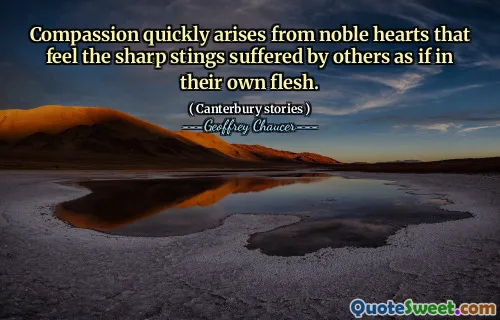
How quickly compassion invades noble hearts!
This quote encapsulates a universal truth about human nature — the swift and profound impact of compassion on people of noble character. It suggests that those with inherent nobility, perhaps in their morals or spirit, are naturally receptive to feelings of pity or empathy for others. The phrase "invades noble hearts" emphasizes the rapidity and involuntary nature of this emotional response, implying that compassion is not a deliberate act but rather an innate reaction that moves such individuals deeply and immediately.
Reflecting on this, one might consider the power of empathy to transform interactions and relationships. Compassion acts as a bridge that connects us to the suffering or needs of others, urging us to act kindly and supportively. Noble hearts — those marked by virtue, integrity, and kindness — are predisposed to this empathetic connection, which further amplifies their generosity and understanding.
Moreover, the quote's poetic tone underscores the beauty of such rapid emotional resonance. In a world often criticized for apathy or indifference, the quick invasion of compassion offers a hopeful reminder of our innate capacity for care and kindness. It also challenges us to cultivate nobility within ourselves, encouraging a spirit that responds swiftly and deeply to the hardships of others. Such a mindset fosters community, compassion, and ultimately, a more humane society.
In the context of Geoffrey Chaucer's "Canterbury Tales," a work populated with diverse characters whose moral qualities are vividly portrayed, this quote would resonate with themes of virtue prevailing amidst human complexity. It speaks to the enduring value of kindness and empathy across time and culture, celebrating the nobleness of heart as a foundation for social harmony and personal fulfillment.







